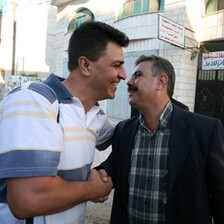The Electronic Intifada 24 June 2009
RAMALLAH, occupied West Bank (IPS) - Egyptian mediators have set 7 July as deadline for final Palestinian reconciliation talks in Cairo. The Egyptians say time is running out, and if there is no progress in July, they will no longer be prepared to arbitrate.
Continued political detention and abuse of Palestinian prisoners by Hamas in Gaza and by the Fatah-affiliated Palestinian Authority (PA) in the West Bank could, however, derail the talks before they even begin.
The Gaza-based Palestinian Centre for Human Rights (PCHR) says abuse of political detainees by both major Palestinian factions is rife, and a number of Palestinian detainees have died in detention.
“We have repeatedly called on both the Hamas and Fatah leadership to cease mistreatment and arrest of opposition activists based on their political affinities,” says Raji Sourani, PCHR founder and director.
“Although we were told by the respective leaders of both factions that they would look into the matter, the situation remains unchanged,” Sourani told IPS. “We as Palestinians have experienced political detention and abuse for 41 years under the Israeli occupation, and now we are doing it to ourselves.”
At least four Palestinians have died in detention in the last couple of years.
The latest victim died a week ago in a jail in Hebron in the southern West Bank. Haytham Amr, 33, a nurse and Hamas member, is believed to have been tortured to death by the Palestinian General Intelligence Service (GIS).
The family informed PCHR that security forces had claimed that their son attempted to escape, and in doing so jumped down from a second floor. During the fall, it was claimed that Amru fell onto his knees and abdomen, and accordingly suffered a hemorrhage in the lungs that led to his death.
A PCHR field worker, who saw the body, reported blue and red marks all over. The PCHR has questioned the PA’s version of events, and called for an investigation.
A vital first step if reconciliation between Hamas and Fatah is to stand a chance of succeeding is the fulfillment of a demand by both sides for the release of their men held in jails in the West Bank and Gaza, and the cessation of politically motivated arrests.
Under Egyptian pressure, and after hours of preliminary reconciliation negotiations held in both Palestinian territories, PA President Mahmoud Abbas said he would release all Hamas detainees in the West Bank before the final round of Palestinian unity talks in Cairo 7 July.
Azam al-Ahmad, head of the Fatah bloc in the Palestinian Legislative Council, told Al-Jazeera on Monday that the order would take effect in the coming days. He did not mention how many prisoners would be freed.
“The gesture aims at putting an end to division and lays the ground for Palestinian reconciliation talks to be held by Egypt next month,” al-Ahmed said.
The PA had announced earlier that it would release 20 men last week. Hamas says only some were released, while another 27 of its men were arrested in raids across the northern West Bank over the last two weeks. “Fatah claims of releasing 20 prisoners out of 760 detainees, who suffer all kinds of torture, is a joke,” Hamas MP Ismail al-Ashkar said at a news conference.
Dr. Ahmed Yousef, political advisor to Gaza-based Hamas leader Ismail Haniyeh, says that release of Hamas prisoners in the West Bank is a make or break moment for the unity talks.
“If Abbas releases those prisoners, then Hamas will reciprocate by releasing Fatah men held in Gaza,” Yousef told IPS. “Most of those arrested in Gaza were detained in response to the hundreds of our men who were incarcerated in the West Bank.”
Hamas holds far fewer political detainees than the PA, and released a number of Fatah men several months ago. But dozens are still in Hamas custody.
Following the mass arrest of political rivals by both Hamas and the PA on the pretext of fighting crime, a multi-party Conciliation Committee has been set up for reconciliation talks in Egypt. The committee, one of whose aims is to monitor the political arrests, is using Palestinian Independent Commission for Citizen’s Rights’ (PICCR) guidelines to determine what constitutes politically motivated detentions.
This happens, says the PICCR, when Palestinian police arbitrarily use a legal pretext to justify detention, prevent an individual from practicing political and civil rights, fail to guarantee a free and fair trial, and when the trial takes place in a military rather than civilian court.
The next few weeks will determine whether Abbas will follow through with his promise to release all Hamas detainees and halt current arrest campaigns, and whether Hamas will follow suit. The fate of the detainees will in turn set the ground for possible rapprochement in Cairo.
“If the Palestinian factions can’t even resolve the release of political prisoners, then unity is a lost cause even before reconciliation talks begin,” says Sourani.
All rights reserved, IPS — Inter Press Service (2009). Total or partial publication, retransmission or sale forbidden.




